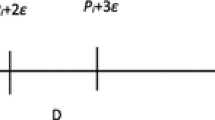Abstract
In textbook models of reputation, a number of entry games are played sequentially. A multimarket incumbent—the chain store—deters entry of “early” small entrants with a threat of predation. In the last markets of the game, entry occurs stochastically. We show that this stochastic entry is due to a restrictive assumption and vanishes if entrants that initially decided to stay out are allowed to reconsider their decision following entry elsewhere.

Similar content being viewed by others
Notes
As there is one entrant per market, we use the market notation \(m\in \left\{ 1,\ldots ,M\right\} \) for denoting the cardinality of set S as well as for indexing the markets.
In this respect we follow MR. KW do not restrict the action space but focus on “reasonable” equilibria—yielding the same outcome.
From \(p_{m}<\overline{\beta }^{m-1}\) we have \(0<\sigma _{m}<1\).
By Bayes rule we have \(p_{1}=\frac{p_{2}}{p_{2}+\sigma _{2}(1-p_{2})}\). Setting \(p_{1}\) equal to the critical level \(\overline{\beta }\) and solving for \(\sigma _{2}\) yields \(\sigma _{2}=\frac{p_{2}}{1-p_{2}}\left( \frac{1- \overline{\beta }}{\overline{\beta }}\right) \).
A related point has also been made by Masso who argued that it is a shortcoming of the traditional reputation games to assume that “... agents can distinguish between those firms that have not yet decided whether to enter the market or not and those that have already decided not to enter” (Masso 1996, p. 58). Contrary to our approach he assumes uncertainty about the ordering and imperfect information on the history of the game, leading to multiple equilibria. In particular, the case where all sm-firms enter and the mm-firm acquiesces every entry remains a sequential equilibrium.
References
Fudenberg, D., & Kreps, D. (1987). Reputation and simultaneous opponents. Review of Economic Studies, 54, 541–568.
Kreps, D. M., & Wilson, R. (1982). Reputation and imperfect information. Journal of Economic Theory, 27, 253–279.
Masso, J. (1996). A note on reputation: more on the chain-store paradox. Games and Economic Behavior, 15, 55–81.
Milgrom, P., & Roberts, J. (1982). Predation, reputation, and entry deterrence. Journal of Economic Theory, 27, 280–312.
Selten, R. (1978). The chain store paradox. Theory and Decision, 9, 127–159.
Author information
Authors and Affiliations
Corresponding author
Additional information
The authors express their gratitude to Paul Heidhues, Jos Jansen, Johan Lagerlöf, and Lars-Hendrik Röller for helpful comments on an earlier version of this paper.
Rights and permissions
About this article
Cite this article
Melles, M., Nitsche, R. Multiple rounds in a chain store game. Theory Decis 81, 571–579 (2016). https://doi.org/10.1007/s11238-016-9551-2
Published:
Issue Date:
DOI: https://doi.org/10.1007/s11238-016-9551-2




